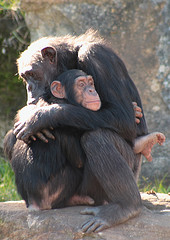The Pan troglodytes ,Also known as the Chimpanzee is and endangered species .An endangered species is an animal that is becoming extinct.The Chimpanzee has becoming extinct since 2009 .The chimpanzee is realated to humans in some kind of way .Scientist believe tht thats were humans come from .
INTRODUCTION AND DESCRIPTION !
The Chimpanzee.
* Is very big and can grow up to 6ft tall.
*The male chimp can weigh up to 154 pounds .
*Female is much smaller ,And can weigh up to 116 pounds .
*walk on all fours or on two legs.
*They knuckle walk.
**HABITAT (&&) BEHAVIOR
The Chimpanzee is ussually in a Pack from six to 10 induals .It is also a predator .Chimpanzee is also an omnivore .It feeds on fruits,leaves,flowers,seeds,insects,and bird eggs.Chimps are known for hunting on small animals such as lepard cubs and monkeys for their meat .
SLEEPING HABITS.The chimpanzee in maintly active during the day and sleep in nest they bulid at night in the tress .Chimanzees Mainly spend their time hunting for alot of food for them and their young .
REPRODUCTION
For the Chimpanzee mating can occur any time of the year. It is more likely to occur though during the rainy season. This is when they have lots of leaves and fruits to feed from. They also have cooler temperatures around them that can offer them higher levels of energy.
The female will carry the offspring in her body for a period of time that ranges from 200 to 260 days. The average is 230 days and they are only a couple of pounds in size when they are born. There is usually only one born but twins are quite common. In fact, the chances of twins are higher than for humans.
The mother will carry her young with her for the first six months of life. She does all she can to protect it from danger. After six months of age it can start to move around on its own but is encouraged to stay close. It can also ride on the mother’s back. Should something happen to the mother, these young Chimpanzees will be adopted by other females. If they are weaned they are sometimes looked after by males.
NATURAL HABITAT!
 The chimapnzee is found in a variety of habitats ,such as open savana woodlands,grasslands and rain forest .The chimpanzee natural habitat is africa .
The chimapnzee is found in a variety of habitats ,such as open savana woodlands,grasslands and rain forest .The chimpanzee natural habitat is africa .
CURRENT AND HISTORICAL POPULATION DATA !
In a population survey of West African chimpanzees living in Côte d’Ivoire, researchers estimate that this endangered subspecies has dropped in numbers by a whopping 90 percent since the last survey was conducted 18 years ago. The few remaining chimpanzees are now highly fragmented, with only one viable population living in Taï National Park, according to a report in the October 14th issue of Current Biology, a Cell Press publicationIn the 1960s, the population of chimpanzees in Côte d’Ivoire was estimated at about 100,000 individuals. At the end of the 1980s, when the first and last nationwide chimpanzee survey was carried out, the total population of chimpanzees was estimated at 8,000 to 12,000 individuals. While that already represented a drastic decrease from the expected numbers, it nonetheless meant that Côte d’Ivoire harbored about half of the world’s remaining West African chimpanzee populations.
Current populaion of chimpanzees .
Due to high levels of exploitation ,loss of habitat and habitat quality due to expanding human activities there species is estimated to have experienced a significan population reproduction in the past 20 to 30 years .
CAUSES OF POPULATION DECLINE ?AND WHAT HAS THREATENED ?
*Habitat loss
*forest loss
*hunting for bushmeat
*degradation of forest threw logging ,farming .
*habitat harvested consumption and cleared to make way for agriculture .
WHAT IS BEING DONE TO HELP THE PAN TROGLODYTES TODAY ??
we are enforced to protect chimpanzees include conserving habitat, rescuing chimp orphans and raising awareness. Loss of habitat, due in large part to demands of a growing human population. JGI protects the youngest chimpanzees that have lost their mothers. The threats to chimpanzees are geared by lack of information and awareness.







awwww it looks like you
ReplyDeletelol shut up ,well iguess WE CUTEEEEEE !
ReplyDelete